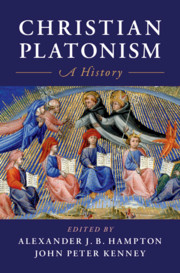Book contents
- Christian Platonism
- Christian Platonism
- Copyright page
- Dedication
- Contents
- Figures
- Contributors
- Acknowledgements
- I Concepts
- II History
- 2.1 The Bible and Early Christian Platonism
- 2.2 Platonism and Christianity in Late Antiquity
- 2.3 Christian Platonism in the Medieval West
- 2.4 Christian Platonism in Byzantium
- 2.5 Renaissance Christian Platonism and Ficino
- 2.6 Northern Renaissance Platonism from Nicholas of Cusa to Jacob Böhme
- 2.7 Christian Platonism in Early Modernity
- 2.8 Christian Platonism in the Age of Romanticism
- 2.9 Christian Platonism and Modernity
- III Engagements
- Index
- References
2.3 - Christian Platonism in the Medieval West
from II - History
Published online by Cambridge University Press: 20 January 2021
- Christian Platonism
- Christian Platonism
- Copyright page
- Dedication
- Contents
- Figures
- Contributors
- Acknowledgements
- I Concepts
- II History
- 2.1 The Bible and Early Christian Platonism
- 2.2 Platonism and Christianity in Late Antiquity
- 2.3 Christian Platonism in the Medieval West
- 2.4 Christian Platonism in Byzantium
- 2.5 Renaissance Christian Platonism and Ficino
- 2.6 Northern Renaissance Platonism from Nicholas of Cusa to Jacob Böhme
- 2.7 Christian Platonism in Early Modernity
- 2.8 Christian Platonism in the Age of Romanticism
- 2.9 Christian Platonism and Modernity
- III Engagements
- Index
- References
Summary
This chapter calls into question the longstanding notion that early Franciscans simply systematized or rehearsed ideas from Augustine and highlights instead how they employed Avicenna and Arabic philosophy to forge a completely new understanding of the bishop’s thought. Although this version of Augustinianism was initially passed off as a reading of the Aristotelian tradition as well, it became disassociated with Aristotle as the next generation came to a more authentic understanding of the Greek philosopher’s thought. By contrast, the Augustinianism invented by early Franciscans continued to be widely promulgated and defended for generations and thus impacted conceptions of Christian Platonism that remain influential to this day.
Keywords
- Type
- Chapter
- Information
- Christian PlatonismA History, pp. 183 - 206Publisher: Cambridge University PressPrint publication year: 2020

